
EKOAB (European Union Research and Application Center)
Our Activities in the Scope of Jean Monnet Chair
Nine Students received EU Studies Certificate
5 July 2018
Nine Students received a Certificate in European Union Studies in the framework of their graduation ceremony on 5 July 2018. They qualified for the Certificate as they either passed four EU-related courses with an average of minimum 2.00 GPA, or three EU-related courses with an average of minimum 3.00 GPA
The Certificate programme was introduced in the fall semester 2016/17 as part of the Jean Monnet Chair project. The intention of the programme is to attract interest in EU studies among students of all departments. The program is open for all 3rd grade students and comprises one introduction course (PSIR 201 History and Institutions of the EU) and two/three EU-related elective courses.
For further information contact Assoc. Prof. Dr. Alexander Bürgin, email: alexander.burgin@ieu.edu.tr.
Survey: Majority of IUE students has a positive attitude towards the EU
4 June 2018
In an anonymous survey, 54 per cent of IUE students stated to have a positive attitude towards the EU, 40 per cent reported a neutral, and 6 per cent a negative attitude. Furthermore, 55 per cent of the students think that the EU is a success story, 42 per cent characterize the EU as neither a success nor a failure, and 3per cent consider the EU as a failure. As regards EU-Turkey relations, 58 per cent agreed that cooperation has resulted in tangible benefits for Turkey, while 20 per cent disagree and 22 per cent are undecided. As regards the future relations, 73 per cent agree that common challenges (e.g. in the areas of migration, trade, sustainable development and foreign policy) require more and deeper Turkey-EU-cooperation; 9 per cent reject this view and 18 per cent were undecided.
Significant differences exist between students from the PSIR department and other departments. 64 per cent of Political Science and International Relations (PSIR) students reported a positive attitude towards the EU in comparison to only 47 per cent of the students from other departments. Asked to characterize their knowledge about the EU, 58 per cent of PSIR students said to have a high or very high level of knowledge, 37 per cent ascribed themselves some knowledge and 5 per cent low or very low knowledge. In contrast, only 22 per cent of the students from other departments reported high levels of knowledge, 56 per cent indicated to have some knowledge and another 22 per cent low or very low knowledge. However, this result does not reflect a general lack of interest in the EU as 36 per cent of the students from other department said that they are very much or quite interested in the EU, and 29 per cent that they are at least somewhat interested.
In total, 139 students participated at this survey (62 from the PSIR department and 77 from the law or business administration department).
Assoc. Prof. Alexander Bürgin, who organised the survey, said: ‘I invite all students who aim to learn more about the EU to participate at the EU Studies Certificate Programme’. To obtain the certificate students have to pass four EU-related courses with an average of CC or three EU-related courses with an average of BB. Further information about the programme can be found here.
Jean Monnet Research Trip to Brussels: Role of Commission in EU environmental policy
22- 24 May 2018
In the framework of his Jean Monnet Chair Project ‘Achievements and Challenges of EU Governance’, Alexander Bürgin inter alia assesses the role of the European Commission in the EU’s environmental and energy policy. To this end, Bürgin participated at the Green Week Conference in Brussels, where he talked with Commission officials, mayors of European Cities and representatives from environmental NGOs. After the conference, Bürgin conducted further interviews with officials from DG Environment.

Jean Monnet Seminar: The Rise of Nationalism and Populism in the EU
9 May 2018
Gyulia Hegyi, former member of the European Parliament from Hungary, hold a seminar on the rise of nationalism and populism in the EU, reflected inter alia in the recent success of populist and often anti-EU parties in several EU member states. Hegyi rebuffed the populist demands for less European integration, stating that a disintegration of the EU would have negative consequences for all member states.
The seminar was organized in the framework of Alexander Bürgin’s Jean Monnet Chair Project ‘Achievements and Challenges of EU Governance’. Around 40 Bachelor- and Master-students as well as faculty of the Political Science and International Relations Department attended the EU-funded event.
To watch the video record of the seminar, please click.
Hegyi mentioned our seminars in his article in the bulletin of European Parliament Former Members Association.
Jean Monnet Seminar on Environmental Policy: Challenges, Achievements and Implications for EU-Turkey Relations
8 May 2018
Gyulia Hegyi, former member of the European Parliament from Hungary, and Ümit Şahin from Sabanci University, Istanbul, discussed the EU’s environmental and climate policy, as well as the potential for EU-Turkey cooperation in this field. Hegyi mentioned the EU’s efforts to enable civil society actors to monitor the respect of environmental standards in their countries in the framework of trade agreements. As regards EU-Turkey cooperation, Hegyi highlighted the benefits of sustainable city projects co-financed by the EU’s Instrument for Pre-Accession Assistance Fund.
Şahin stated that the Mediterranean region would be one of the most affected region by climate change in the future. Therefore, Turkey, the OECD country with the highest increase in CO2 emissions since 1990s, should be more ambitious in its CO2-reduction plans, he said. He argued that recently constructed wind and solar power plants in Turkey produce electricity for a cheaper price per kilowatt-hour than conventional coal-fired power stations or than the guaranteed price per kilowatt-hour for the planned nuclear power station in Akkuyu (Mersin province).
The seminar was organized in the framework of Alexander Bürgin’s Jean Monnet Chair Project ‘Achievements and Challenges of EU Governance’. Around 40 Bachelor- and Master-students as well as faculty of the Political Science and International Relations Department attended the EU-funded event.
To watch the first session of the seminar, please click here; for the second session, click here.
Şahin’s contribution can be found here.
Hegyi's contribution can be found here.
Jean Monnet Conference in Moscow on Excellence in Teaching EU Studies
19-20 April 2018
The European Commission invited Alexander Bürgin, Jean Monnet Chair at Izmir University of Economics, to a Jean Monnet Conference in Moscow. Conference participants discussed best practice in teaching EU studies and elaborated potential for cooperation between Russian universities and partners from other countries.

Roundtable on EU-Turkey-Germany Relations
5 April 2018
Alexander Bürgin, Head of EURAC was invited to hold a speech at a roundtable at Yaşar University, Izmir, titled “Turkey-EU-Germany Relations at a Crossroads: What Future Awaits the Trio? “.Bürgin emphasized that a stronger focus on the social dimension of the EU is necessary in order to win back citizens support for the EU. He argued that France and Germany have to come up with a common position, doubted however that all member states will accept a significant shift of competences from the national to the European level. As regards EU-Turkey relations, he welcomed current reciprocal attempts to improve the relations as both sides benefit from close cooperation.
Further speakers were Dr. Ebru Turhan (Turkish-German University / INSITER Coordinator) and Dr. Ayselin Yıldız (Yaşar University). The roundtable was chaired by Prof. Dr. Aylin Güney (Yaşar University); among the guests was also the German General Consul Dr. Rainer Lassig.
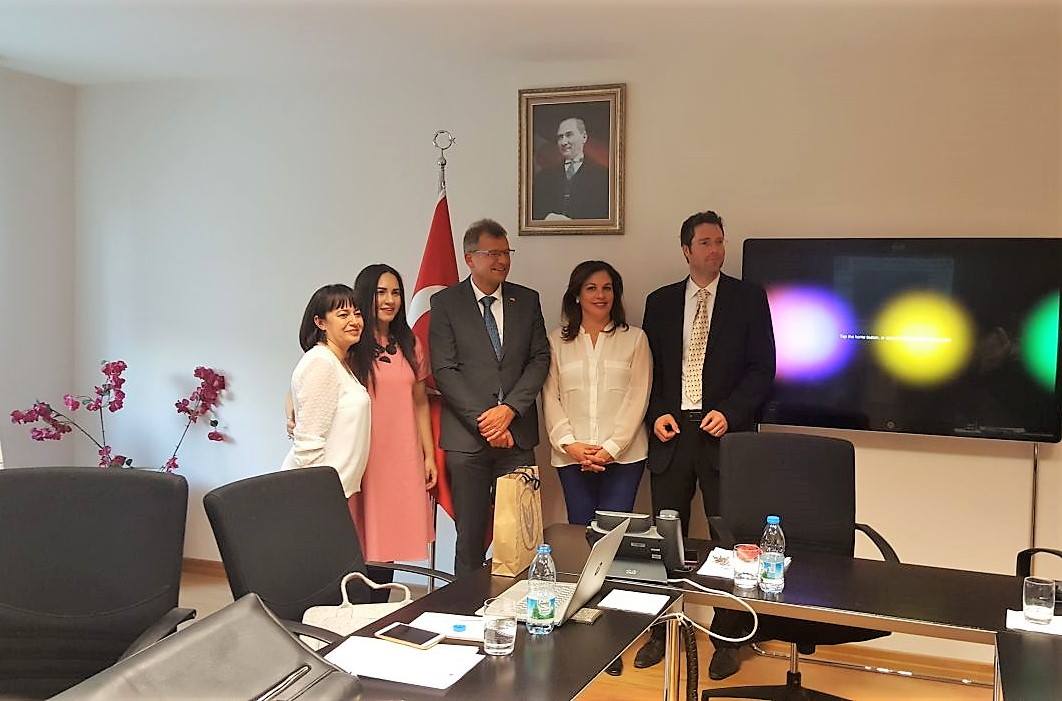
New EU course added to course list
1 March 2018
Alexander Bürgin offers a new elective course on EU Environmental Policy: PSIR 495. The aim of this course is three-fold. First, it aims at explaining the policy making process in the EU, thus enabling students to understand the basics about the power relations between the involved actors. Second, the course aims at presenting the key areas of EU’s environmental policy, including the EU’s role as international actors in this policy field. Third, the discussion of the underlying environmental problems of each policy area shall sensitize students for the need of environmental protection and provide them with knowledge in fields that are of increasing importance also in the Turkish domestic context.
Meeting of the Turkish Jean Monnet Community at Sabanci University
9 February 2018
Assoc. Prof. Dr. Alexander Bürgin, Head of EURAC, attended a meeting of the Turkish Jean Monnet Community at Sabanci University in Istanbul. The participants discussed the current situation of EU-Turkey relations with panelists from the EU delegation in Ankara and exchanged ideas about common activities of the Jean Monnet community in Turkey. The programme and the list of participants can be found here.
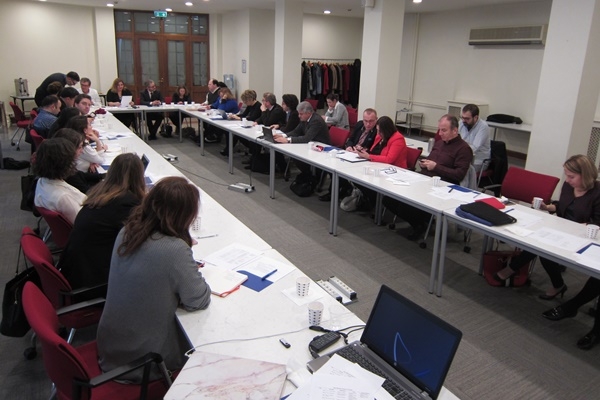
Jean Monnet Seminar: Differentiated Integration between Turkey and the EU
12 December 2017
Ebru Turhan, Assist. Professor at the the Turkish-German University in Istanbul, hold a seminar at Izmir University of Economics on the possibilites and limitations of differentiated integration between Turkey and the EU. Differentiated integration implies an institutionalised incorporation of Turkey in some policy areas of the EU without becoming a full member state. Possible projects for an enhanced functional cooperation include in particular trade relations, energy cooperation, foreign and security policies as well as justice and home affairs. For instance both sides could benefit from projects such as modernised Customn Union, a closer cooperation in border management or the common fight against criminal networks and terrorist organisations.
Turhan's contribution can be found here.
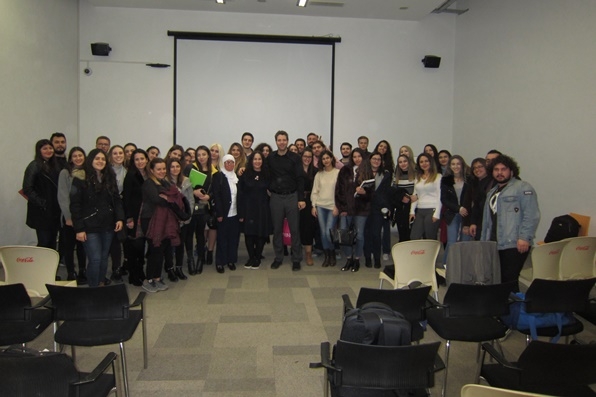
The seminar was organized in the framework of Alexander Bürgin’s Jean Monnet Chair Project ‘Achievements and Challenges of EU Governance’. Around 80 Bachelor- and Master-students as well as faculty of the Political Science and International Relations Department attended the EU-funded event.
Jean Monnet Research Trip: Alexander Bürgin at Brussels
1 December 2017
During a four-days-research trip to Brussels, Assoc. Prof. Dr. Alexander Bürgin, Head of EURAC, interviewed officials from the European Commission, the Council and the European Parliament, as well as members of the European Parliament. The talks were about recent trends in the intra-institutional relations inside the European Parliament and its relations with the European Commission and the Council. The research trip was part of Bürgin’s Jean Monnet Chair Project ‘Challenges and Achievements of EU Governance’. Among the interviewees was Jens Geier, Member of the European Parliament from the Party of European Socialists.

Jean Monnet Conference: The Future of the EU
27 November 2017
Associate Prof. Dr. Alexander Bürgin, Head of EURAC, was invited by the European Commission to a international Jean Monnet conference on the future of EU. Devoted to the current major political turning point in EU history and its consequences for the future of European integration, the conference gathered nearly 40 renowned speakers and 350 participants, selected from around 1500 applications from scholars. Applicants had to submit an essay on one of the five conference themes: Deepening of the Economic and Monetary Union, The future of European Defence, Harnessing globalisation, The social dimension of Europe, and The future of EU budget. The programme and the speakers’ profile can be found here.
Students Received EU Studies Certificate
7 July 2017
13 students received a Certificate in European Union Studies in the framework of their graduation ceremony. They qualified for the Certificate as they passed four EU-related courses with an average of minimum 2.00 GPA.
The Certificate programme was introduced in the fall semester 2016/17 as part of the Jean Monnet Chair project. The intension of the programme is to attract interest in EU studies among students of all departments. The program is open for all 3rd grade students and comprises one introduction course (PSIR 201 History and Institutions of the EU) and three EU-related elective courses.
For further information contact Assoc. Prof. Dr. Alexander Bürgin, email: alexander.burgin@ieu.edu.tr.
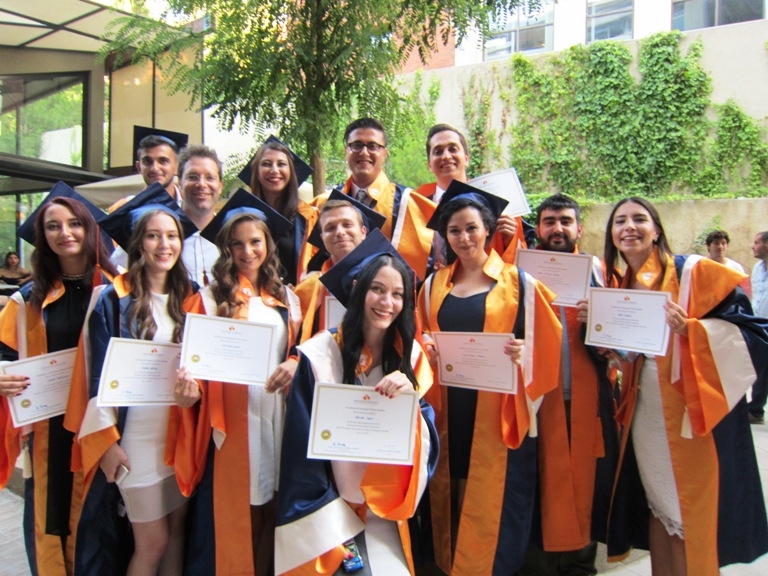
Jean Monnet Seminar on the Future of EU-Turkey Relations
5 May 2017
Hüseyin Bağcı, Professor at Middle East Technical University, Ankara, hold a seminar at Izmir University of Economics on the future of EU-Turkey relations. In his speech Bağcı focused on recent developments in international relations, the internal problems of the EU and the tense relationship between Turkey and the EU. He argued that despite the current alientation it is neither in Turkey’s nor the EU’s interest to officially end the accession talks.
The seminar was organized in the framework of Alexander Bürgin’s Jean Monnet Chair Project ‘Achievements and Challenges of EU Governance’. Around 50 Bachelor- and Master-students as well as faculty of the Political Science and International Relations Department attended the EU-funded event.
Bağcı’s contribution can be found here.
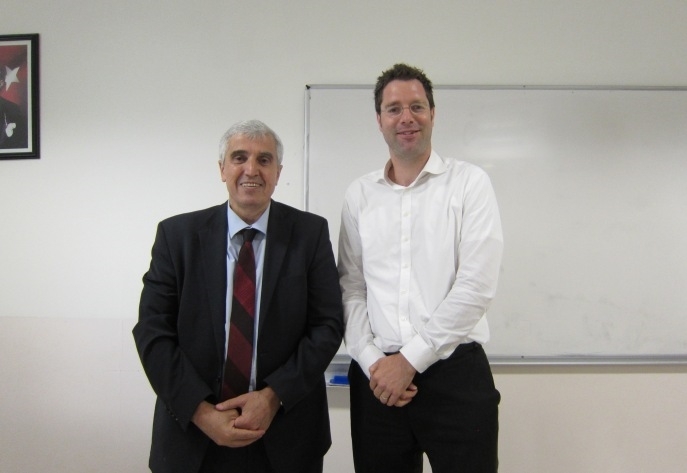
Jean Monnet Seminar on visa free travel for Turkish citizens
6 December 2016
Ciğdem Nas, Associate Professor at Yildiz Technical University, Istanbul, and Secretary General of the Economic Development Foundation, hold a seminar at Izmir University of Economics, titled ‘EU Turkey dialogue on visa free travel for Turkish citizens: Progress and Problems’. In her speech Nas argued that the abolition of the visa duty would not imply new security threats or a significant increase in irregular migration for the Schengen states.
The seminar was organized in the framework of Alexander Bürgin’s Jean Monnet Chair Project ‘Achievements and Challenges of EU Governance’. Around 70 Bachelor- and Master-students as well as faculty of the Political Science and International Relations Department attended the EU-funded event.
Nas' contribution can be found here.
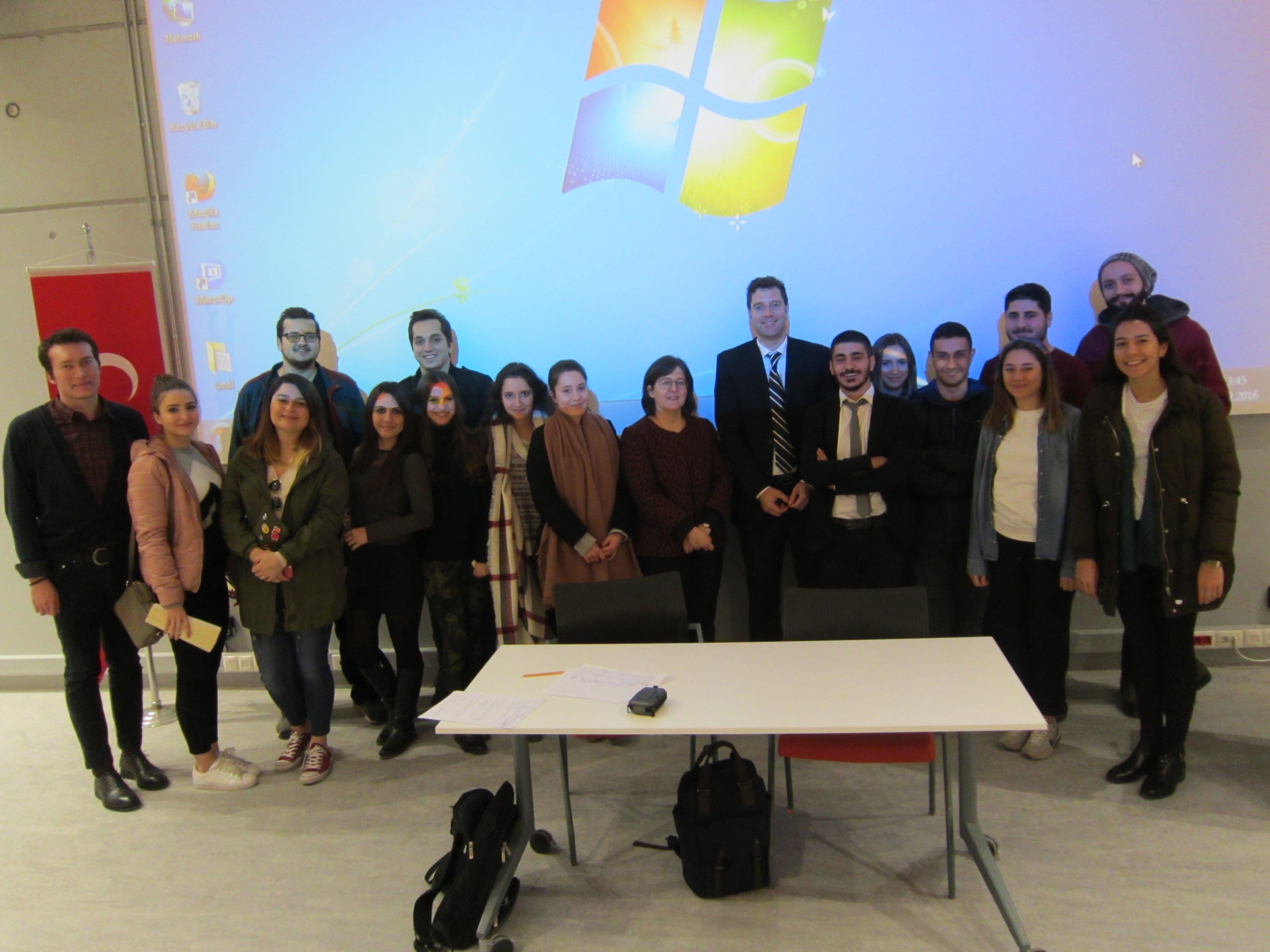
In her speech Nas argued that the abolition of the visa duty would not imply new security threats or a significant increase in irregular migration for the Schengen states. ‘Since the criteria for visa liberalization embody cooperation between Turkish and EU law enforcement agencies such as Europol and Eurojust, it will intensify judicial cooperation between the parties making the fight against crime more effective’, so Nas. Furthermore, she said that ‘visa liberalization is not expected to increase the migratory pressure from Turkish citizens due to increased job opportunities in the country and higher living standards’. Finally she argued that the new European Travel Information and Authorization System (ETIAS), proposed by the European Commission on 16 November, ‘will make it possible for officials to track down all travelers to the Schengen area and prevent the entry of those who are deemed as a threat in terms of security’.
For the visa waiver Turkey has to fulfill approximately 70 conditions, including a functioning readmission agreement and reforms in areas of document security, border management, asylum, human rights and cooperation with EU member states and EU agencies. While Turkey’s progress in fulfilling the benchmarks has been acknowledged by the Commission, the European Parliament has stressed that the visa obligation can only be lifted if all the benchmarks have been fulfilled, in particular, the requirement to change anti-terror laws, which are considered by the European Parliament as being also used to constrain the freedom of expression. The visa-waiver has to be approved by a qualified majority in the Council and a simple majority in the EP. The Turkish President countered that antiterror legislation will not be changed and threatened to withdraw from the commitment to readmit irregular immigrants from the EU, should the visa-waiver not be realized in the near future.
Main obstacles for a visa waiver have been summarized by Çiğdem Nas at the Jean Monnet Seminar on 5 December 2016 as follows:
- The remaining criteria which Turkey has yet to fulfill in the Roadmap for visa liberalization. These are: revision of the anti-terror legislation, revision of the data protection law, revising anti-corruption strategy in line with GRECO recommendation, operational agreement with Europol, cooperation with the EU in criminal justice matters plus the implementation of the Turkey-EU readmission agreement and transition to EU-compatible biometric passports. Especially the first of these criteria proved to be quite controversial since the EU requires Turkey to narrow down the definition of terrorism so that it will not effects acts which may be seen as limited to freedom of expression while Turkey protests that it cannot revise its related legislation in an environment of active fight against terrorism. Talks among the Turkish and EU officials are still ongoing on how a working formula may be devised in this respect.
- Even if Turkey fulfills the remaining criteria for visa liberalization, the ensuing ratification process by the Council of the EU and the EP will prove to be difficult. The EP adopted a critical stance against developments in Turkey under the state of emergency and even recommended the temporary suspension of negotiations. The EP’s approval could only be possible based on the termination of the state of emergency in Turkey and an improvement in human rights and freedoms. As for the Council, its approval would also include the above-mentioned points and in addition the establishment of a mechanism for the suspension of visa liberalization under conditions of security threats, or upsurge in migrant flows. Such a mechanism would be a general measure to be adopted not only against Turkey but citizens of all other non-EU countries.
An article of Assoc. Prof. Dr. Alexander Bürgin in Euractiv (16 March 2016) regarding the issue can be found here.
EU financed research trip to Brussels
October 21, 2016
Assoc. Prof. Dr. Alexander Bürgin, Head of EURAC, interviewed officials from the European Commission and the European Parliament, including for instance Klaus Welle, the Secretary General of the European Parliament (see photo). Topics were the reorganisation of the European Commission, the Energy Union and EU-Turkey relations. The research trip was part of his Jean Monnet Chair Project ‘Challenges and Achievements of EU Governance’, financed by the EU.
Alexander Bürgin invited to Jean Monnet Conference in Brussels
October 17, 2016
Assoc. Prof. Dr. Alexander Bürgin, Head of EURAC, was invited to a Jean Monnet Conference in Brussels. At the two-day conference, 250 professors from all across the world discussed the EU’s role in promoting peace, security, prosperity and democracy. Another topic was the role of academia in global governance.
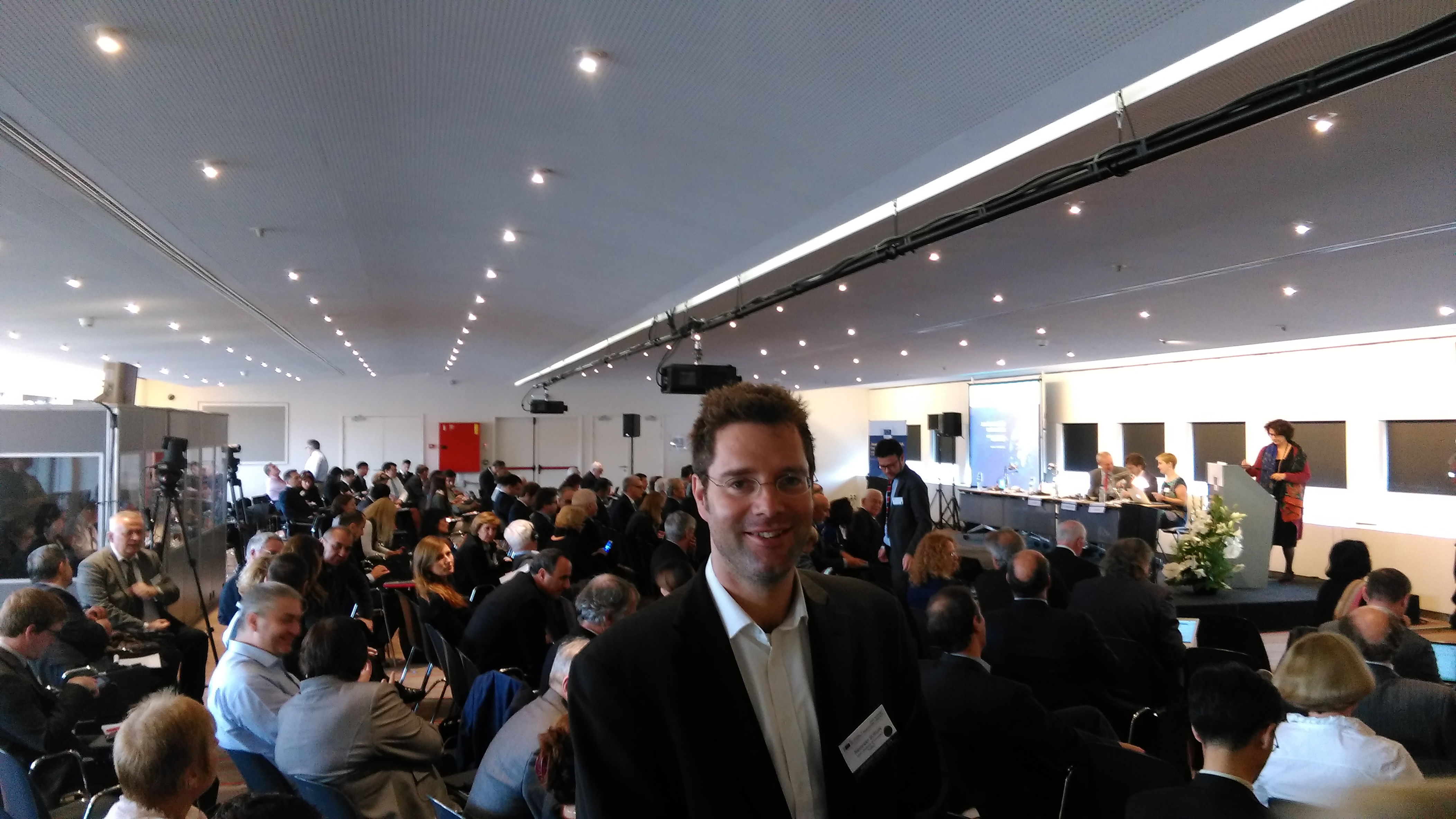
Certificate in EU Studies
September 18, 2016
In the framework of the Jean Monnet Chair activities a new Certificate Program on EU studies will be introduced in the fall semester 2016. The program is open for all 3rd grade students and comprises one introduction course (PSIR 201 History and Institutions of the EU) and three EU-related elective courses. Students with an average of minimum 2.00 GPA in these four coursces will receive the Certificate. A Certificate does not mean a separate undergraduate program. It shows that an undergraduate student gets an expertise in a specific field.
For registration and further information, please contact Assoc. Prof. Dr. Alexander Bürgin (Jean Monnet Chair), email: alexander.burgin@ieu.edu.tr
Jean Monnet Seminar on Foreign Policy Challenges
December 9, 2015
Senem Aydın-Düzgit, Jean Monnet Chair at İstanbul Bilgi University, hold a guest lecture at Izmir University of Economics, titled ‘Foreign Policy Challenges: Which Potential for Cooperation between Turkey and the EU?’ In her speech she presented findings of her most recent book (Turkey and the European Union, Palgrave 2015), published together with Nathalie Tocci. The guest lecture was organised in the framework of Alexander Bürgin’s Jean Monnet Chair Project ‘Achievements and Challenges of EU Governance’. Around 50 Bachelor- and Master-students as well as faculty of the Political Science and International Relations Department attended the EU-funded event.
Aydın-Düzgit's contribution can be found here.
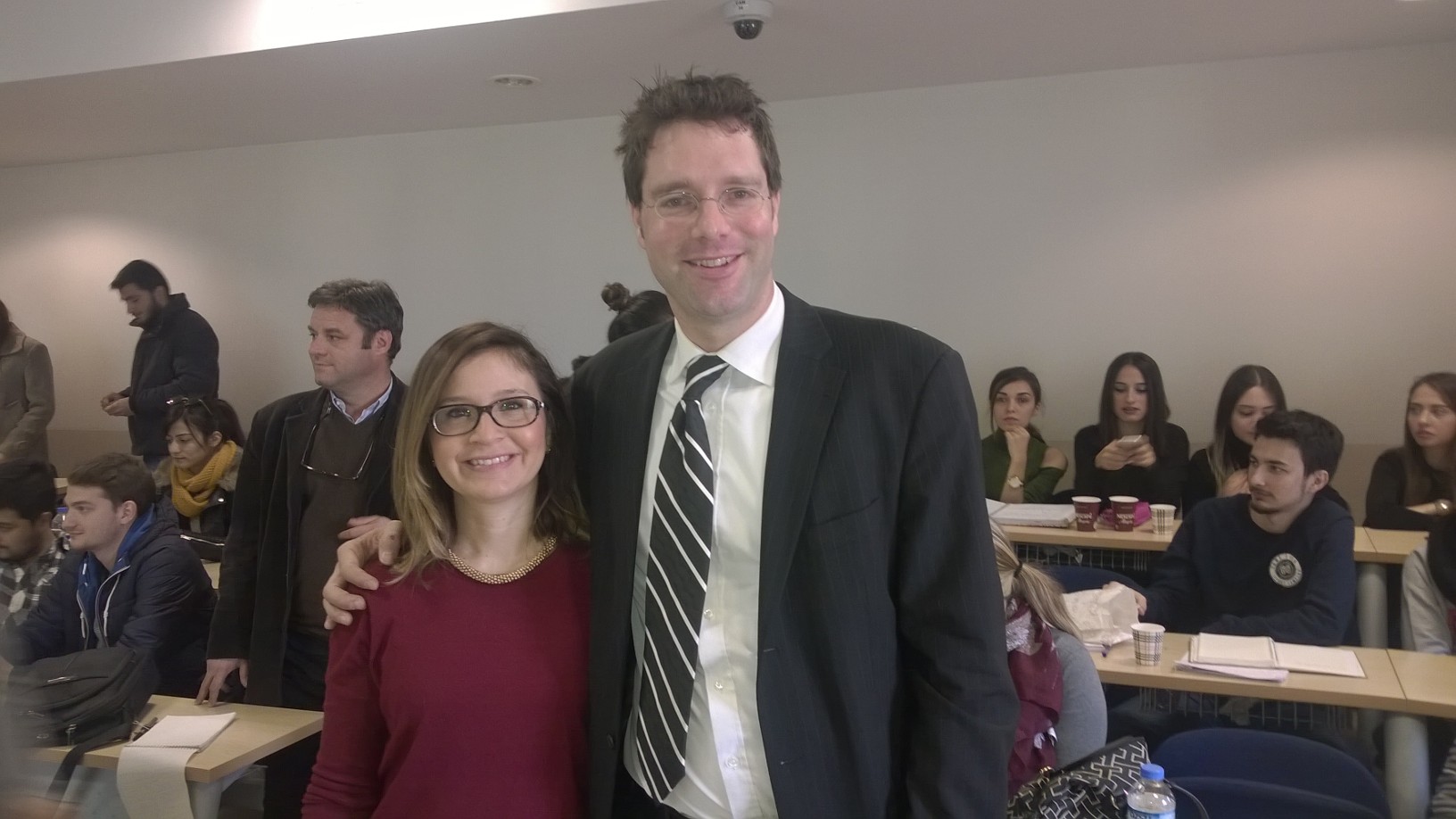
Alexander Bürgin presented his Jean Monnet Chair Project
December 3, 2015
Alexander Bürgin, Head of EURAC, was invited by the Turkish National Agency Higher Education Unit to speak about his Jean Monnet Chair project at an info-day on EU funded projects in Istanbul. During the workshop representatives of around 100 Turkish universities were informed about the application process for EU co-financed projects such as Joint-Master Programmes, Jean Monnet Projects, Modules and Chairs.
Alexander Bürgin's Speech at 15th Academic Year Opening Ceremony
October 7, 2015
Assoc. Prof. Dr. Alexander Bürgin, Head of EURAC, held a speech on the state of the European Union and EU-Turkey relations at IUE's 15th Academic Year Opening Ceremony. In his speech he highlighted the merits of of the EU and the benefits of EU-Turkey cooperation. He also talked about his Jean Monnet Chair Project and encouraged students to take courses on the EU. The speech can be found here.
NEWS |ALL NEWS

Alexander Bürgin has been awarded Jean Monnet Chair for the second time
Assoc. Prof. Dr. Alexander Bürgin, Head of European Union Reasearch and Application Center (EURAC) and lecturer at the department of Political Science
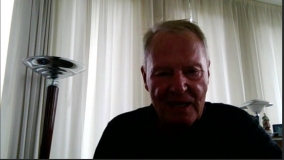
EURAC Seminar on EU’s economic policies and relations with Turkey
Hans-Olaf Henkel, Member of the European Parliament 2014 – 19, President of the Federation of German Industries 1995-2001, and President of IBM
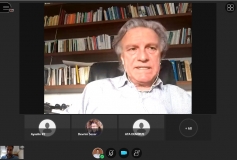
We hosted Takis Hadjigeorgiou at the EURAC Online Seminars
Takis Hadjigeorgiou, member of the European Parliament 2009-19 and Vice President of the EU-Turkey Joint Parliamentary Committee of the European Parliament 2014
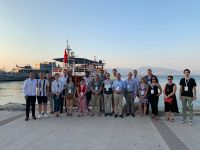
EURAC hosted German Turkish Social Market and Innovation Forum for Young Academics
In partnership with the Konrad Adenauer Foundation and the German Academic Exchange Service, the European Research and Application Center (EURAC) at the
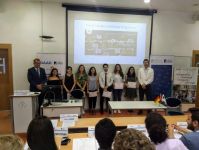
German Consul handed EU Certificate to students
Twelve students received a Certificate in European Union Studies. The certificates were handed by German Consul to Izmir, Dr. Rainer Lassig.
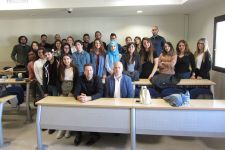
Three Seminars on the EU with Robert Evans
Robert Evans, member of the European Parliament 1994-2009, and lecturer at Royal Holloway College, University of London, hold three seminars at IUE
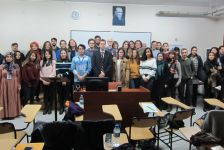
Seminar at Dokuz Eylül University
Assoc Prof. Alexander Bürgin, head of EURAC, was invited to hold a presentation on the European Union at Dokuz Eylül University.
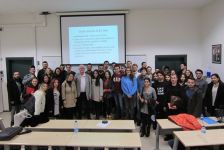
EURAC Seminar on Current Challenges for the EU
Jens-Peter Bonde, member of the European Parliament 1979-2008, hold three seminars on current challenges for the EU at IUE.
